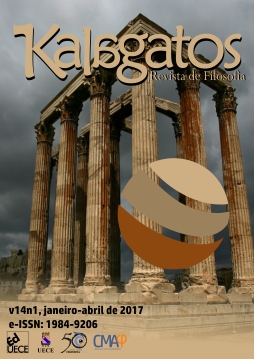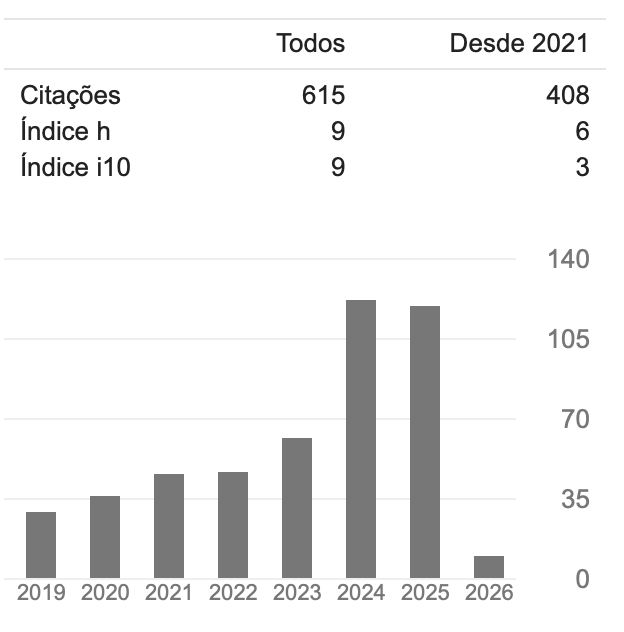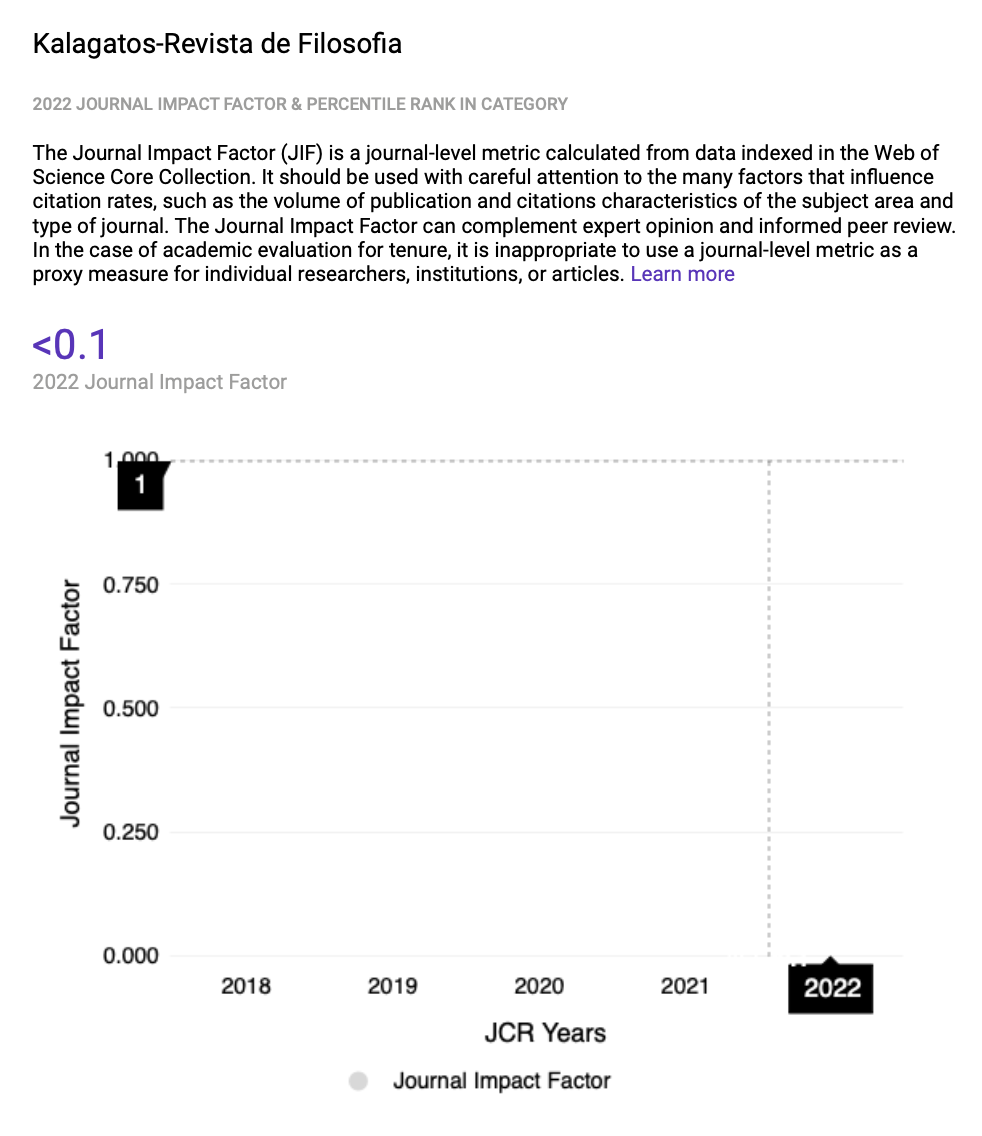Subjetividade e “autenticidade” em Kierkegaard e a sua influência na ontologia de Heidegger
DOI:
https://doi.org/10.23845/kalagatos.v14i1.6245Palavras-chave:
Existencialismo, Subjetividade, Autenticidade, Ontologia, VerdadeResumo
Foca-se em fazer uma incursão nas influências existencialistas de Martin Heidegger a partir da concepção de subjetividade como verdade de Søren Kierkegaard. Objetiva, em específico: delimitar a influência da subjetividade em sua expressão de autenticidade e demonstrar como a autenticidade em Heidegger foge dos parâmetros isolacionistas kierkegaardianos. Como resultados, há de se compreender que, diferentemente do que é comumente apontado, há grande influência da construção existencialista da subjetividade Kierkegaard em Heidegger, o que finda por dar azo às questões de autenticidade, muito embora Heidegger se afaste desse paradigma ao tratá-la segundo suas inclinações comunitárias.
Downloads
Referências
ALVES, Rubem Azevedo. O enigma da religião. 6. ed. São Paulo: Papirus, 2007.
BEISER, Frederik. Hegel. New York: Routledge, 2005.
BICCA, Luiz. Racionalidade moderna e subjetividade. São Paulo: Loyola, 1997.
CAREL, Havi. Life and Death in Freud and Heidegger. Amsterdam: Rodopi, 2006.
COME, Arnold Bruce. Kierkegaard as humanist: Discovering my self. Mon-treal: McGill-Queen’s UP, 1995.
COOPER, David Edward. Filosofias do mundo: Uma introdução histórica. Trad. Dinah de Abreu Azevedo. São Paulo: Loyola, 2002.
CUMMING, Robert Denoon. Phenomenology and Deconstruction: The dream is over. Chicago: The University of Chicago Press, 1991.
DE BEISTEGUI, Miguel. Heidegger and the political: Dystopias. New York: Routledge, 1998
.________. Truth and Genesis: Philosophy as differential Ontology. Blooming-ton: Indiana UP, 2004.
DUBOIS, Christian. Heidegger: Introdução a uma leitura. Trad. Bernardo Barros Coelho de Oliveira. Rio de Janeiro: Jorge Zahar, 2004.
DYRERUD, Thor Arvind. You Have no Truth Onboard: Kierkegaard’s Influence on Norway. In: STEWART, Jon (Org.). Kierkegaard’s International Recep-tion: Northern and Western Europe. Burlington: Ashgate, 2009. p. 121-172.
ERBER, Pedro Rabelo. Política e verdade no pensamento de Martin Hei-degger. São Paulo: Loyola, 2003.
ERIKSEN, Niels Nymann. Kierkegaard’s Category of Repetition: A recon-struction. Berlin: De Gruyter, 2000.
ERICKSON, Glenn Walter. Negative Dialectics and the End of PhilosophyWolfeboro: Longwood Academic, 1990.
________. The Question of the Meaning of Being. Ann Arbor: UMI, 1976.
FEENBERG, Andrew. Heidegger and Marcuse: The Catastrophe and Re-demption of History. New York: Routledge, 2005.
FERRATER-MORA, José. Dicionário de Filosofia. 2. ed. Trad. Maria Stela Gonçalves. São Paulo: Loyola, 2005. v. 2.
GILSON, Caitlin Smith. The Metaphysical Presuppositions of Being-in-the-world: A Confrontation Between St. Thomas Aquinas and Martin Heideg-ger. New York: Continuum, 2010.
HEGEL, Georg W. F. Science of Logic. Trad. W. H. Johnston e L. G. Struthers. London: George Allen & Unwin, 1951.
HEIDEGGER, Martin. Ser e Tempo. Trad. Márcia Sá Cavalcante Schüback. 3. ed. Rio de Janeiro: Vozes, 2008.
GARDINER, Patrick. Kierkegaard. Trad. Antonio Carlos Vilela. São Paulo: Loyola, 2001.
KELLER, Pierre. Husserl and Heidegger on Human Experience. Cam-bridge: Cambridge UP, 2004.
KIERKEGAARD, Søren. O Conceito de Angústia: Uma Simples Reflexão Psicológico-Demonstrativa Direcionada ao Problema Dogmático do Peca-do Hereditário de Vigilius Haufniensis. Trad. Álvaro Valls. Petrópolis: Vozes, 2010.
________. Post-Scriptum aux Miettes Philosophiques. Trad. Paul Petit. Paris: Gallimard, 1941.
LOUREIRO, Isabel Maria. Herbert Marcuse: A Relação Entre a Teoria e Prá-tica. In: LOUREIRO, Isabel Maria; MUSSE, Ricardo (Org.). Capítulos do marxismo ocidental. São Paulo: EdUNESP, 1998. cap.3, p. 99-120.
LÖWITH, Karl. Jener Einzelne Kierkegaard: Materialien zur Philosophie Sören Kierkegaard, Frankfurt: Suhrkamp 1979.
MARCUSE, Herbert. Schriften:Der Deutsche Künstlerroman, Frühe Aufsärzse. Frankfurt: Suhrkamp 1981.
MCCARTHY, Vincent A. The Phenomenology of moods in Kierkegaard. The Hague: Martinius Nijhoff, 1978.
MORAN, Dermot. Introduction to Phenomenology. New York: Routledge, 2000.
PELIZZOLLI, Marcelo Luiz. O Eu e a Diferença: Husserl e Heidegger. Porto Alegre: EDIPURS, 2002.
ROVIGHI, Sofia Vanni. História da Filosofia Contemporânea: Do Século XIX à Neoescolástica. Trad. Ana Pareschi Capovilla. 3. ed. São Paulo: Loyola, 2004.
SAFRANSKI, Rüdiger. Heidegger: Um Mestre da Alemanha Entre o Bem e o Mal. São Paulo: Geração Editorial, 2000.SHANKS, Andrew. God and Modernity: A New and Better Way to do Theolo-gy. New York: Routledge, 2000.
VALLEGA, Alejandro A. Heidegger and the Issue of Space: Thinking on Exilic Grounds. University Park: Pennsylvania State UP, 2003.WOOD, David C. The Deconstruction of Time. Evanston: Northwestern UP, 2001.
ZILLES, Urbano. Gabriel Marcel e o Existencialismo: Porto Alegre: Acadê-mica, 1988.



















